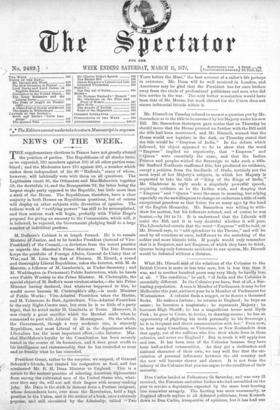Mr. Disraeli on Tuesday refused to answer a question put
by Mr. Samuelson as to the title to be assumed by her Majesty under his new Bill. Mr. Samuelson thereupon gave notice that on Thursday he should move that the House proceed no further with the Bill until the title had been mentioned, and Mr. Disraeli, warned that the House would not legislate in the dark, on Thursday stated that the title would be "Empress of India." In the debate which followed, his object appeared to be to show that the word " Empress " implied no superiority, that " Empress " and " Queen " were essentially the same, and that the Indian Princes and peoples wished the Sovereign to take such a title. Sir Stafford Northcote reaffirmed this, but produced no evidence, except a petition from the landlords of Oude, certainly not the most loyal of her Majesty's subjects, in which her Majesty is requested to take the title of "King of the Kings of India." Mr. Gladstone in reply made a singularly powerful speech, requiring evidence as to the Indian wish, and denying that " Empress " and " Queen " were the same in meaning, but relying especially on the unwillingness to change or embarrass a title of such exceptional grandeur as that borne for so many ages by the head of the English Monarchy. Mr. Samuelson was willing to with- draw his motion, but his followers refused, and of course he was beaten,—by 284 to 31. It is understood that the Liberals will resist the Bill, and it is very doubtful whether it will pass. The Liberals feel certain that the word " Empress " will be held, as Mr. Disraeli says, to "add splendour to the Throne," and will be used by all courtiers at once, indifferent to the smirching of the nobler and more historic title. If people would only remember that it is Emperor, and not Empress, of which they have to think, Queens being only fortunate accidents in our system, Mr. Disraeli would be defeated without a division.


































